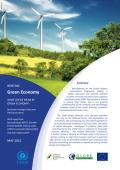The paper explores the concept of ‘green growth’ as it has emerged in international policy discourse over recent years. Identifying the core meaning of the concept and sister terms such as ‘green economy’, it relates green growth to the prior concept of sustainable development. The paper distinguishes between a ‘standard’ version of green growth which asserts the long-run economic benefit of environmental protection and a ‘strong’ interpretation which claims, more boldly, that environmental policy can be a driver for growth. Three different forms of this claim are identified and the evidence for them surveyed. The first is a Keynesian argument for short-term ‘green stimulus’ in times of recession. Second, a revision of standard growth theory identifies the contribution made to growth by investment in natural capital and the correction of a variety of market failures through environmental policy. Third, the theories of comparative advantage and long waves of capitalism emphasise the importance of technological innovation in generating growth.

Reinvigorated by the United Nations Environment Programme (UNEP), a global discussion and national activities on green economy transitions have regained momentum since 2008. The increase in interest is, among other things, due to the growing understanding of the similarity and interlinkages between many of the recent financial, economic, environmental and social crises.
The 2008 global financial crisis focused attention not only on the financial losses, and implications for economies, jobs and housing, but also raised questions as to the fundamental imbalance in our economies. The choice of capital allocation - investment in property, fossil fuels and financial assets, rather than in measures to encourage resource efficiency - has created destructive imbalances. A further common element to all these crises is the focus of decision making on short time horizons and trust in what has often proven to be an incomplete evidence base including a lack of proper accounting, for example as regards the cost of climate change and biodiversity.
This report aims at providing the emerging lessons from a representative sample of case studies in 20 developing countries that could help policy makers to address implementation challenges, including overcoming political economy and affordability constraints. The sample has selected on the basis of a number of criteria, including the country's level of development (and consumption), developing country region, energy security and the fuel it subsidies (petroleum fuel, electricity, natural gas).
